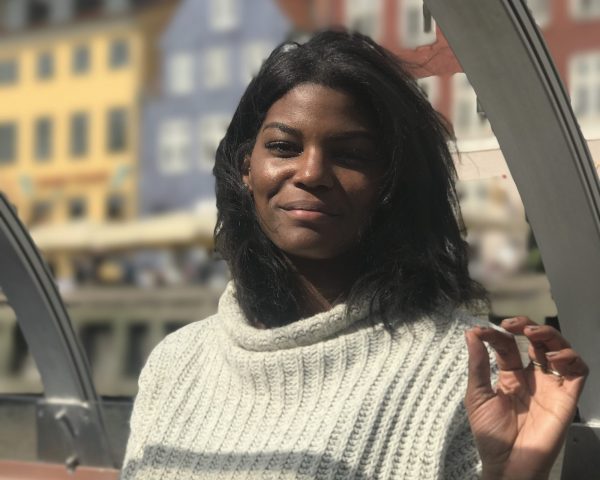I’m going to be completely honest with you; before I met the Danish boy that would soon become my partner, I had little knowledge of the quaint, chilly country of Denmark or the Scandinavian region as a whole. I had a rough “guesstimation” of where the countries lied, and that the average temperature was considerably colder than the Southern Californian climates I was raised in – I was also pretty proud to know that those colorful LEGO building blocks hailed from Denmark, but not much beyond that.
It wasn’t until the American markets became saturated with books about the untranslatable ‘hygge’ word and Denmark earned the title of ‘Happiest Country in the World’ that my interest in the country and Scandinavian area increased.
I also began dating a true Dane – taller than all hell, milky white skin, and a penchant for biking, eating pork, and playing/watching football – who through our relationship, gave me a new depth of understanding around the country he called home.

We met while au pairing in Paris (pause for eye-roll reaction to the corniness) and continued a long-distance relationship for almost three years, with him going back to Denmark and me settling into my new home in Austin, Texas – a real change from my former San Diego residence.
The distance became more and more of a burden and was really the most masochistic thing I’ve ever signed up for, so my partner and I began the mental tug-of-war of deciding who was going to move where: either him moving to the States or me moving to Denmark.
Making the Choice
The decision seemed almost inconceivable at first, but then 2016 came around. As a Black woman, now living in Texas, I was experiencing enough culture-shock with the increasing division and racial tensions that were rising in the Southern regions of America.
Things that I took for granted in California – such as affordable birth control and having basic regulations that prohibited people from carrying guns openly anywhere their heart desired – were becoming increasingly substantial and began weighing on my sanity and concept of safety.
I had traveled abroad a fair amount before my time in Texas, but I can say I never felt as unsafe and unsure of my health and livelihood as I did during the last months of 2016 in Texas.
I began truly feeling my Blackness at that point, because all I was seeing on the news was people who looked like my family and myself being belittled, or ignored, or shot in the streets. And with the rising hate that was bubbling in my home country around people who looked like me, I made the then obvious decision – to me at least – to make the move to one of the supposed happiest countries on this earth.
Adjusting to Life Overseas
I had been planning to go back to school for my Masters and found a brand-new Intercultural Studies program that made me do that cartoon trope where I shot massive hearts out from eyes, accompanied with that “Aah-Oooh-Gaa” sound bite; needless to say, I was pretty stoked about it.
It wasn’t long after moving that I found a waitressing job at an American BBQ restaurant (I know, a real stretch for me), and began settling into my new home with my partner. Though I seemed to be adjusting well to the country, it’s hardy foods, and incredible public transportation, I won’t lie, the culture shock hit me hard and stayed present for my entire first year.
It wasn’t just the change of diet, or lifestyle, or the fact that my thighs were constantly sore from biking, or that the winter brought the most depressing lack of sunlight I had ever experienced; it was what I perceived to be the constant, unwavering stares and observations from the Danes that were now my neighbors.
My blackness was on display, at all times. And yes, of course it always has been, but it’s never felt so different, so rare, or so inimitable. Walking down the street, either by myself or side-by-side with my Danish man, I felt all the stares, every single one of them, all over my skin; sometimes I swear I felt itchy after. I felt exposed constantly. I finally understood what it must feel like to be an animal in a zoo; on display for others to explore with curious, vague looks.
Dealing With Differences
The stares were uncomfortable, but that discomfort was only maximized with the endless questions about the political unpredictability of my home country, or the lengthy explanations of why I refer to America as my home and not Africa, despite my dark complexion.
In my first few months in Denmark, I felt small and became exhausted from the mental energy it took to hold my head high and not let the looks, questions, or ignorance affect me.
It wasn’t until about six months into living in Denmark that I had a major break in my attitude and approach to the cozy, cold country. Perhaps it was my growing comfortability in my education, or my solid group of international and local friends, or maybe it was that I was sick of playing the victim. Whatever it was, I realized that in all the ways I believed the Danes were making me feel different or uncommon, I could choose to flip the switch and view their looks and brash inquiries as what they truly were: curiosity.
It was me and only me that was putting the negative spin on all of the conversations and observations the locals had, and that it was me and only me feeling less than because of my melanated skin. Yeah, a Black girl in Denmark is pretty unique.
But you know what else it is, special; and I have the special and incredible opportunity to educate and show Danes what it is like to be an African-American woman. I’ve written about my unofficial, self-proclaimed role as the African-American Ambassador in Denmark before, and it still stands true today.
When I look back at any cringy conversations, or what us Americans would refer to as “politically-incorrect” questions, I can now see that they all surfaced from an honest curiosity and willingness to cease the opportunity to learn more about the Black experience from a Black person themselves. And yes, the stares weren’t very pleasant, but then I came to the crazy realization that Danes just like to stare.
They are observant as hell and don’t see looking someone up-and-down as a threat or anything with ill-intention; they’re just simply inquisitive and want to check out what’s going on.
Of course, you can never speak for a whole country or a whole city’s residents, but I can honestly say, that despite the discomfort I felt with being a minority in a rather homogenous country, I never once felt threatened or unsafe by the glances or conversations. During my time in Denmark, I never experienced an internal pain or unease similar to those I felt when living in the South of the US.
Lessons Learned
Once I began to look inside myself, and be honest about the perceptions that I was assuming Danes had about me and my ethnicity, I came to realize three extremely important things:
- What others think of me is none of my damn business (truly understanding this will take you so fucking far in life, it’s scary).
- That my difference was, and always will be, my greatest strength.
- Being a minority abroad is not only a learning and growing experience for yourself, but for every single person you come in contact with along your travels.
Just like representation of diversity is imperative in the media and various industries, it is increasingly indispensable in the many countries that do not have exposure to ethnicities outside of their own population.
It is up to us, the travelers, to not only seek our own expansion, but the growth and understanding of those whose home countries we inhabit.
Like the title reads, it’s not just black and white; it’s not simply being a black woman living in a predominately white country, and it’s not only my perception of myself or the perceptions of others about me. It’s not just the color of my skin or the language I speak that sets me apart in this space; it is a beautifully eclectic combination of all of those things, swirling around in a gorgeously intricate cauldron of experience.

So, if you’re a person of color who is unsure about what your experience would be travelling in the picturesque, commodious Scandinavian region, I understand. I too struggled with the fear of sticking out and of not being accepted for how I looked.
But if I learned anything from my time in Denmark, it has been that it is because of how I look, that I have an extraordinary opportunity to inform and educate people about my experience, and the experiences of many millions of other minorities.
And if you’re still not sure if Scandi is right for you, just remember that you don’t have to mortgage your home to pay for a doctor’s visit and you can drink on the streets here, so, that pretty much makes up for a lot.
All photos courtesy of Candace Stephens.














































